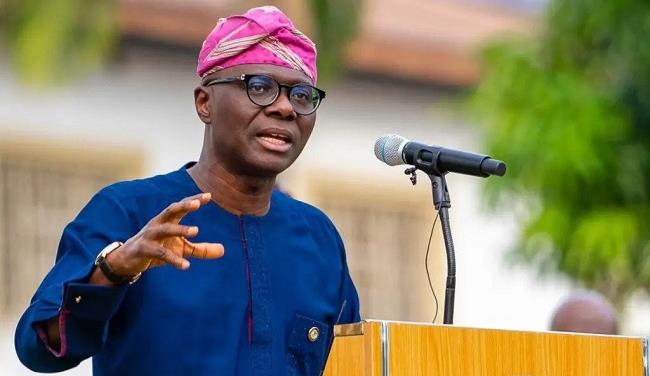The Lagos State Government says it is committed to developing a robust and resilient climate infrastructure, to reduce the risks and vulnerabilities from climate change on the state.

Mr Babajide Sanwo-Olu, Governor of Lagos, gave the assurance during an interactive session between by All Progressives Congress (APC) and the Organised Private Sector (OPS) on Monday, February 13, 2023, in Lagos.
Sanwo-Olu stated that his administration had made strong case for infrastructure to address climate change at the COP27 in Egypt.
COP27 is the 27th session of the Conference of the Parties to the United Nations Framework Convention on Climate Change.
The Lagos Governor stressed the need for the private sector to support the government in its bid to develop resilient climate infrastructure.
“We are committed to doing this because an attempt not to build the infrastructure has larger consequences for the economy and this is why at COP27, we made a strong case to build a strong and resilient climate infrastructure for the state,” he said.
Sanwo-Olu also pledged his administration’s commitment to further activating the creative industry, scaling up technology and data investments under the THEMES agenda.
He added that the state would do more to provide critical transport, education and healthcare infrastructure across the state.
“We look to give citizens options on the transportation system via rail, water and road transport system.
“We have built over 1,000 classrooms under my tenure and there’s remarkable improvement in the West African Examination Council (WAEC) results.
“In healthcare, we handle COVID-19 pandemic well and we are rebuilding Macy Hospital to become a 10-floor hospital and have plans to build an infectious disease research hospital to handle any pandemic situation in the future,” he said.
The governor reiterated his resolve on inclusive development in all areas of the state to decentralise the centre of the city.
“We have several interventions that are delibrately aimed at pushing investments and development in form of education, infrastructure to Badagry, Epe and other areas of the state,” he said.
Mr Babatunde Fashola, Minister of Works and Housing, noted that the current APC led administration inherited aging and dilapidated infrastructure, but had done a lot to turn the story of the country around for good.
The minister noted that roads connecting Lagos to other states were being attended to in half the time it had taken previous administrations to do same.
He added that the impact of the APC led government infrastructural strides on the job creation aspects and other components of the economy were without compare.
“Let us remember that at the beginning of the APC administration, we campaign about security, economy and corruption.
“At the federal level, the major problem we met was insurgency and terrorism, and now Nigerians are facing the other party that ran away from the problem and the one that confronted the problem.
“Do you want to go back to those that didn’t attend to them or those that have started the job.
“On infrastructure, we noticed that Nigerians were ‘japaing’ because of the quality of infrastructure, knowing that infrastructure builds the economy and the quality of life.
“We decided to address infrastructure to increase economic growth, so that the effect would be more felt with our well laid out economic plan and ways of optimisation of government revenue,” he said.
Mrs Adejoke Orelope-Adefulire, Senior Special Adviser to President Muhammadu Buhari on Sustainable Development Goals (SDGs), said the APC led administration was committed to the universal call to action to end poverty.
She added that the call to action would ensure that all people irrespective of their agenda and status enjoys peace and prosperity.
She, however, emphasised the importance of government working with the expertise of private sector to ensure the success of and fast tract the goals of the SDGs within a short timeline.
“The APC government is also willing to ensure more social inclusion such as more women inclusiveness in its administrative make-up to engender the actualisation of the SDG on gender equality.
“The APC government is fairer to Nigerian women and they are ready to do more,” she said.
Mr Ben Akabueze, Director General, Budget Office of the Federation, said the private sector would be well advised to take greater interest in public finance engagement and be more involved at the policy level.
He noted that the needs of government had grown very significantly over the period, particularly with population increase, but its resources had not grown enough.
Akabueze revealed that in 2016, government to Gross Domestic Product (GDP) ratio was under eight per cent, but had grown to nine per cent against its 15 per cent goal.
He added that the country’s infrastructure stock, which was 15 per cent seven years ago, was currently at 35 per cent against the 70 per cent goal countries needed globally.
He, however, stressed that the country would have been in a worse state if the infrastructural choices were not made, even with hovering debt concerns.
“We understand the need to double growth rate for people to begin to feel the growth and to achieve double GDP growth takes action from both private and public sector.
“We require public investment in order of N350 trillion and while N50 trillion is to come from government, the rest is expected from private sector.
“What we are about is what government needs to do, to buy in the weight of the private sector,” he said.
By Rukayat Moisemhe
